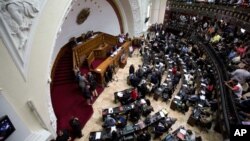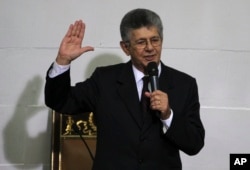Venezuela's new opposition congress is finally getting down to the business of writing laws, but it's unclear whether the socialist-controlled courts and other institutions will enforce them.
Opponents of the ruling socialist party stepped back from the brink of a showdown between the branches of power on Wednesday when they agreed to unseat three contested lawmakers.
The Supreme Court had said those lawmakers could not be sworn in until officials had investigated claims that they engaged in voter fraud. The high court later said anything the legislature did would be null until the lawmakers were gone.
Opposition leaders are calling the move a tactical retreat from an "institutional ambush'' and are starting to outline policy proposals. Chief among the initiatives are proposed legislation to give amnesty to jailed activists, a bill to give people in public housing the title to their homes, and a project to audit major institutions.
"There are many Venezuelans who are temporarily behind bars. In the coming days, we are going to free them so that they can participate in the great development of our country,'' opposition lawmaker Richard Blanco said on the floor Thursday.
But while the opposition has a strong mandate from its landslide victory in the Dec. 6 legislative elections, supporters of the revolution started by late President Hugo Chavez still control virtually every other institution.
The socialist party enjoyed a 17-year winning streak in national elections, amassing near-total control over all major state institutions. But while the opposition congress may have a lot of power on paper, that power is still untested.
Congress president Henry Ramos says opposition leaders would have to find a way to legislate while being "besieged'' by the other branches of government.
Sometimes you have to sacrifice some things to save others,'' he told television station Globovision Wednesday.
Lawmakers started work Thursday on legislation that would free dozens of people imprisoned because of their participation in 2014 anti-government protests. Human rights groups consider these activists to be political prisoners, but the government says they precipitated violence that left dozens dead.
Maduro has warned that he would "never accept'' an amnesty law, and outgoing congressional president Diosdado Cabello, who remains one of the socialist party's most powerful figures, repeated that sentiment last week.
"They think they can make a law that allows murderers to pardon other murderers,'' he said.
The opposition may have the votes needed to overturn a presidential veto, but it's far from certain that the courts loyal to the socialist party would uphold its will.
Another sign of constitutional disarray: It's unclear whether the opposition, which won exactly two-thirds of congressional seats, will retain its crucial super-majority now that the three contested lawmakers are gone.
Congressional leaders argue that they should keep their commanding majority because the overall size of congress is now smaller. Socialists say the calculation should still be made using the total capacity of congress, meaning that the opposition loses the super-majority as long as those seats remain empty.
Even as the rank-and-file starts work, congressional leaders are eyeing the next institutional fight.
They have convened a committee to start looking into alleged court packing and the rush appointment of 13 Supreme Court justices last month. That would be the first step toward replacing the justices, one of whom ran unsuccessfully in December as a congressional candidate with the socialist party.





